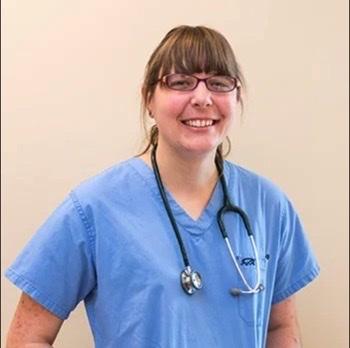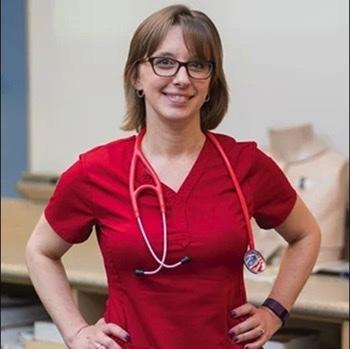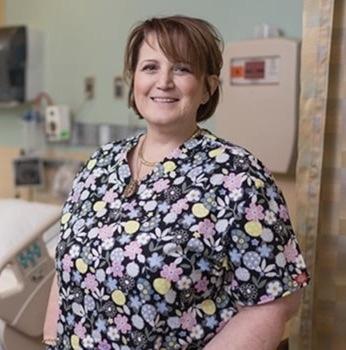Three Ways to Launch and Grow a Nursing Career

Today’s “average” nursing unit consists of men and women with varying education backgrounds—associate or bachelor’s degrees, as well as nursing diplomas—all of which lead to a Registered Nurse (RN) credential. Although there are multiple ways to launch a dynamic career as a RN, nearly all options for expanded job opportunities in the nursing profession require a bachelor's degree in nursing (BSN).
Let’s explore the routes that working nurses take to launch and grow their careers in health care!
Three Pathways, One Profession
Meet Our Nursing Alumni

Valerie ’18
Nursing Experience: 2 years as a RN
Education Background: Associate Degree in Nursing
I spent seven years working as an LNA and when I graduated from nursing school at NHTI, I got a job as a charge nurse in long-term care facility.
Eager to get her BSN, Valerie searched for options that were affordable and would accept her credits. As an NHTI graduate, Valerie took advantage of the CCSNH Nursing Partnership: an agreement between UNH CPS and New Hampshire’s Community Colleges that maximizes transfer credits and offers a significant tuition savings.
I was able to transfer everything and start right up in the nursing classes. That was great because it saved me time and money. I was surprised how simple it was, too. It seems like the college really wants students to maximize their previous education in pursuit of a new degree. All I had to do was provide my transcripts.

Jenn ’17
Nursing Experience: 10 years as an LPN and 1 year as a RN
Education Background: B.S. in Microbiology
Right out of high school, I got a Bachelor of Science in Microbiology. Soon after, I got married and started a family. I wasn’t initially using my degree but once the kids were old enough and I could go back to work, my husband reminded me that I’d always talked about becoming a nurse.
Jenn enrolled in a Licensed Nursing Assistant program with the Red Cross, which gave her a foundation and entry point into a career in nursing. She soon added a Licensed Practical Nurse (LPN) credential and worked in this area of nursing for 10 years.
Right out of LPN school, my first nursing job was at a rehabilitation and nursing home. From there, I worked for several other healthcare providers and learned a lot but after several years, I began to see that my LPN was limiting me from the types of work I wanted to do.
By that point, Jenn developed an interest and focus working as a rehab nurse. She worked in this setting doing skilled nursing while earning her RN and Certified Rehab Nurse (CRN) credential.
Once I became a RN, the job opportunities weren’t what I expected. I thought that I’d be able to get any type of nursing job I wanted. What I realized is that I needed a bachelor’s if I wanted to explore more advanced positions within the nursing care spectrum. There are new things that I want to learn beyond being a floor nurse and getting a BSN will open up the door.

Teri ’17
Nursing Experience: 33 years as a RN
Education Background: Nursing Diploma
I graduated with a diploma in nursing from Concord Hospital School of Nursing in the 1980s and today, I am a maternal health nurse with a specialty in lactation. Nursing chose me. I always knew I would be a nurse and never thought about another career. I love being able to help new moms and dads become the best parents for their children. Shortly before attending college, I became a member of our unit’s management team. I began working on policy revisions and developing ways to improve our programs. Since beginning my BSN degree, I became the coordinator of our Child Passenger Safety program, chaired several committees, and expanded our lactation program.
Because of changes in the healthcare field, many experienced RNs with nursing diplomas, just like Teri, are being asked to add a bachelor’s degree to their credentials and experience.
It was not my choice to return to college—it was required. However, it was my choice to attend UNH CPS. I embraced the experience, put my heart into it, and I am proud that I will have my BSN soon!
Why is a BSN becoming a job requirement?
This trend stems from changes in the health care industry. The Magnet Recognition from the American Nurses Credentialing Center is recognized across the field as the ultimate seal of quality. To earn this distinction, health care providers need to have a high percentage of nurses with a BSN degree or higher, such as a master's degree (MSN). At UNH College of Professional Studies, we are especially proud to offer an RN to BSN program that complements a wide range of nursing backgrounds and experiences so health care professionals can provide the best care possible for patients. Our online courses make it easier for students to balance their busy schedule alongside nursing coursework and our accreditation and achievements reflect a level of quality that support the value of a Granite State College education.